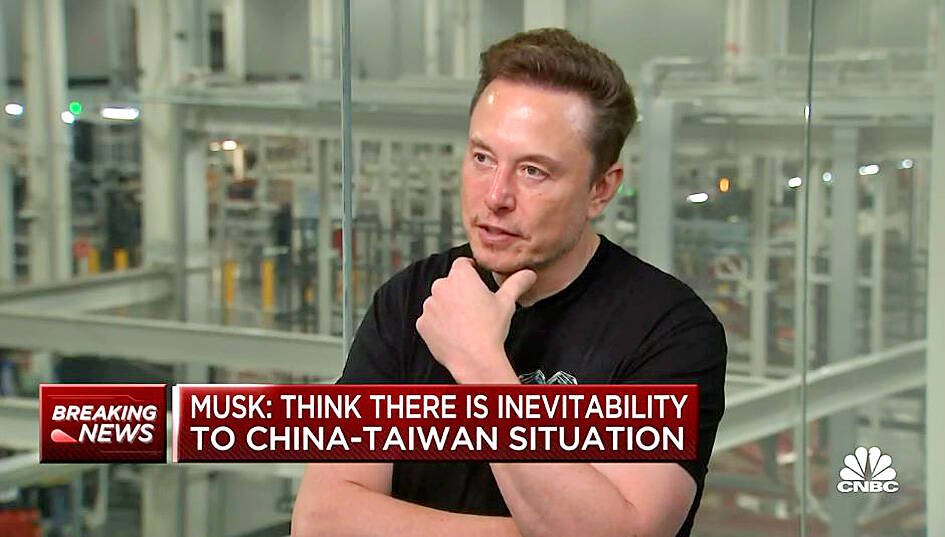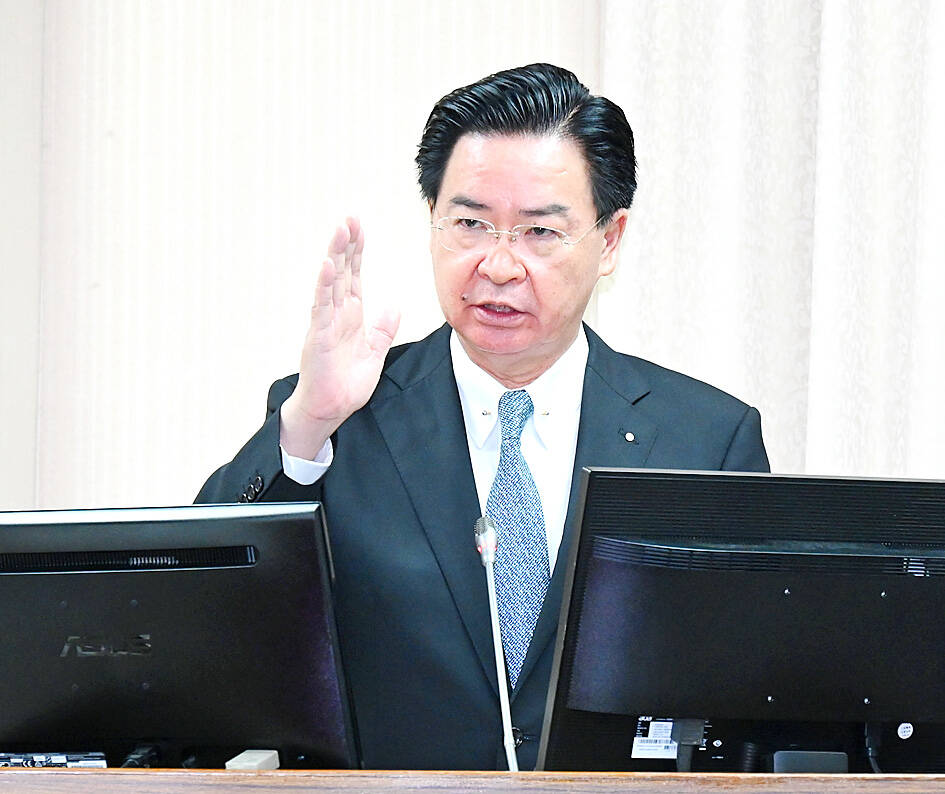Minister of Foreign Affairs Joseph Wu (吳釗燮) called out Elon Musk on Twitter, saying the value of democracy transcends that of money after the Tesla CEO said that China was likely to “integrate” Taiwan.
Asked in an interview with CNBC on Tuesday last week if “China would make a move to take control of Taiwan,” Musk said that “the official policy of China is that Taiwan should be integrated... One does not need to read between the lines.”
“There is a certain inevitability to the situation,” he added.

Photo: screen grab from CNBC
“That is their policy, and I think you should take their word seriously,” Musk said.
Regarding whether such a move by China would be bad for Tesla, Musk said that the Chinese economy and the global economy are like conjoined twins and any attempt to separate them would affect them both.
Responding to Musk’s comments, Wu on Friday wrote on Twitter that the Chinese Communist Party’s “bullying & threats are a concern, especially for those who would rather stay free & democratic.”

Photo: Chu Pei-hsiung, Taipei Time
Beijing’s global expansion undermines the rules-based international order and “status quo,” he added.
“Mr. @ElonMusk, other than money, there is something we call VALUES,” he wrote on the Ministry of Foreign Affairs’ Twitter account.
The post has so far received more than 130,000 views and hundreds of responses, with some commenters praising Wu for speaking out, saying they believe Musk only cares about his own interests.
Other commenters said they believed Musk was only expressing the thoughts of the business community and that Taiwan would never boycott Tesla.
Among them was Mark Simon — previously the personal assistant of Jimmy Lai (黎智英), the jailed founder of Hong Kong’s Next Digital, formerly Next Media — who said that taking on Musk was a “bad fight to pick.”
Separately, a report published by The Economist on Thursday said that from the perspective of China, the Starlink satellite Internet system provided to Kyiv by Musk’s Space Exploration Technologies Corp (SpaceX) not only puts Russia at a disadvantage in its war with Ukraine, but also raises concerns about Taiwan.
If SpaceX gave Taiwan access to the system, it would make a Chinese invasion much more difficult, it said.
Analysts say that if China invaded Taiwan, it could start by severing the 14 undersea Internet cables that keep the country connected to the world, the report said, adding that Taiwan is adding cables and planning how to defend its landing points.
The government is also testing antennae in 700 locations, including outside Taiwan, that would be able to send and receive signals from low Earth orbit satellites, like the ones Starlink uses, The Economist said.
Although China has the capability to shoot down satellites, the Starlink network is made up of more than 4,000 satellites and aims eventually to have tens of thousands.
As such, China might have more success leaning on the SpaceX CEO to deny Taiwan access to Starlink, given that Musk’s other major venture, Tesla, has a large factory in Shanghai, The Economist said.

EVA Air is prohibiting the use of portable chargers on board all flights starting from Saturday, while China Airlines is advising passengers not to use them, following the lead of South Korean airlines. Current regulations prohibit portable chargers and lithium batteries from check-in luggage and require them to be properly packed in carry-on baggage, EVA Air said. To improve onboard safety, portable chargers and spare lithium batteries would be prohibited from use on all fights starting on Saturday, it said. Passengers are advised to fully charge electronic devices before boarding and use the AC and USB charging outlets at their seat, it said. South

Hong Kong-based American singer-songwriter Khalil Fong (方大同) has passed away at the age of 41, Fong’s record label confirmed yesterday. “With unwavering optimism in the face of a relentless illness for five years, Khalil Fong gently and gracefully bid farewell to this world on the morning of February 21, 2025, stepping into the next realm of existence to carry forward his purpose and dreams,” Fu Music wrote on the company’s official Facebook page. “The music and graphic novels he gifted to the world remain an eternal testament to his luminous spirit, a timeless treasure for generations to come,” it said. Although Fong’s

WAR SIMULATION: The developers of the board game ‘2045’ consulted experts and analysts, and made maps based on real-life Chinese People’s Liberation Army exercises To stop invading Chinese forces seizing Taiwan, board gamer Ruth Zhong chooses the nuclear option: Dropping an atomic bomb on Taipei to secure the nation’s freedom and her victory. The Taiwanese board game 2045 is a zero-sum contest of military strategy and individual self-interest that puts players on the front lines of a simulated Chinese attack. Their battlefield game tactics would determine the theoretical future of Taiwan, which in the real world faces the constant threat of a Chinese invasion. “The most interesting part of this game is that you have to make continuous decisions based on the evolving situation,

China’s military buildup in the southern portion of the first island chain poses a serious threat to Taiwan’s liquefied natural gas (LNG) supply, a defense analyst warned. Writing in a bulletin on the National Defense and Security Research’s Web site on Thursday, Huang Tsung-ting (黃宗鼎) said that China might choke off Taiwan’s energy supply without it. Beginning last year, China entrenched its position in the southern region of the first island chain, often with Russia’s active support, he said. In May of the same year, a Chinese People’s Liberation Army Navy (PLAN) force consisting of a Type 054A destroyer, Type 055 destroyer,